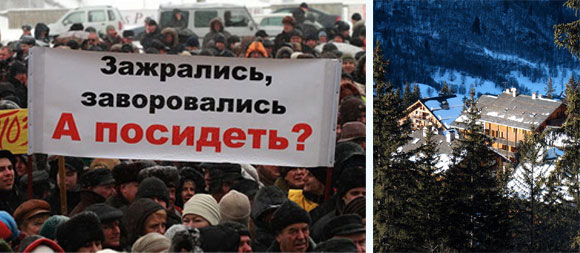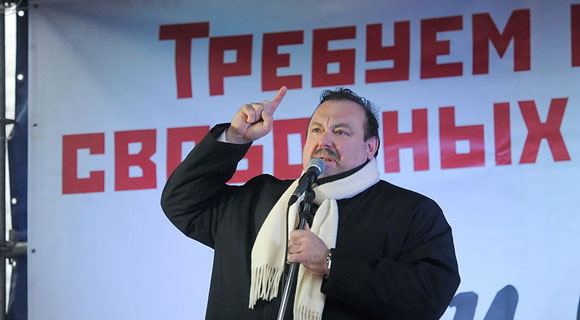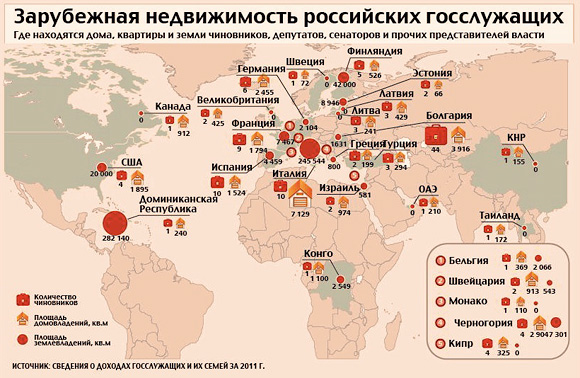Earlier this August, a draft law banning government officials from owning real estate outside Russia or having offshore bank accounts was submitted to the State Duma. It seems that the bill has not been taken seriously by the officials, nor by the press, since, in Russia, similar restrictions have been traditionally evaded, and many government officials and deputies – with no fear of disclosure –are successfully combining business with public service. On the other hand, the media has reported, based on unofficial leaks, that Vladimir Putin issued a secret order requiring government officials to return their assets from abroad within a year. Those who disobey will be punished. Until now, foreign assets served as restraint on the road toward full-blown authoritarianism. Tatyana Stanovaya, IMR expert and the head of the Analytics Department of the Center for Political Technologies, discusses what could happen if this prohibition stands and whether the “end of Courchevel” (i.e. end of foreign property ownership) is will also be the end of Democratic Russia.

In early August, Kommersant reported that the Kremlin was going to come up with a harsh law that would ban foreign property ownership and offshore bank accounts for government officials. According to a Kremlin source, this would become a test to determine the extent of patriotism of the officials whose frequent travels to Courchevel and other excusive destinations has been a major cause of the public’s irritation with government.
The State Duma is currently considering two versions of the bill. The first version provides that four categories of government officials—members of the Federal Assembly, governors, regional deputies, and category “A” government officials—would publicly disclose information on particular websites about their foreign property and bank accounts. According to the bill, government officials could face criminal charges if the information is not disclosed or is distorted.
The second version is aimed at all individuals who, in accordance with the ”Law Against Corruption” are required to disclose information about their income and expenses, foreign property ownership, and off-shore bank accounts. The bill bans officials from owning property abroad unless it is a job-related necessity, and from having foreign bank accounts unless the accounts are used to cover medical or educational expenses. This prohibition also applies to government officials’ spouses and minor children. The law would provide that violators would be subject to a fine of 5-10 million rubles or imprisonment for up to 5 years and thereafter barred from holding public office for three years.
As the Kremlin source explained to Kommersant, “This is not the case of a two-way setup, when a harsher draft is introduced specifically for the purpose of obtaining easy approval of the softer one.” The Kremlin is prepared to face a potentially negative reaction to the proposed legislation; today, “even some members of the United Russia, who do not feel which way the wind is blowing will oppose the bill.” As soon as the bill becomes a law, however, “Gudkov and others will not be able to say they are being prosecuted for political reasons; the ban will apply to everyone.”

Gennadii Gudkov speaking at Bolotnaya Square protest on December 10th, 2011
Most likely, the catalyst for this legislation was the situation around deputy Gennadii Gudkov, who may be stripped of his mandate by the State Duma for illegal entrepreneurial activity. The move against Gudkov is not due to the fact that Russian law was violated; virtually all deputies, senators, and bureaucrats are involved with prohibited business activities. The problem is that Gudkov, who received the mandate with the Kremlin approval, has drifted to the opposition and joined mass protests. For those who violate their tacit agreement with the rulers, Russian law is applied to the fullest extent.
As often happens in our country, however, the intentions of the Kremlin’s ideologues went beyond the boundaries of their original plans. The usual “toothless” anti-corruption initiative (of which there have been many) may be different this time and could become a powerful lever of pressure on the country’s bureaucracy and elite. Perhaps the upper echelons of power are considering the possibility that political developments will turn against them. Russian authorities cannot avoid being concerned about how would a hypothetical official react in case of considerable political destabilization, decreasing public approval of the government, and escalation of protest activity.
Given the fact that the majority of bureaucrats, deputies, and senators live their lives between two countries, this is not a rhetorical question. Their children are enrolled in the best foreign schools and universities, their money is in offshore bank accounts, their comfort ensured by houses and yachts in Europe. In the corridors of the Russian government, one hears stories about ministers flying in from another country to attend a meeting in Moscow, having dual citizenship, and, in general, arranging their lives “there,” abroad, in peaceful and well-developed countries.
The adoption of a law in Russia does not necessarily mean that it will be enforced. It is a system that works in accordance with the principles of “manual transmission” and will be steered more by the personal directives of Putin, than legislation. Vedomosti of August 22 reports that “Kremlin sources […] argue that Putin gave a secret directive to his subordinates to return their foreign assets to Russia within a year.” The newspaper suggests this is an attempt to legitimate foreign assets. It is unlikely, however, that the Kremlin would follow this path under conditions where the leadership is losing popular support, particularly as the people are very close to venting their anger at the dramatic price increases for gas and communal services. Legitimating castles in France, yachts, and Swiss bank accounts with millions in them would mean suicide for Putin’s regime. Another explanation comes to mind.
From Putin’s perspective, he is being cornered. In the eyes of the West and the opposition, he is clinging to power.
What then is the essence of Putin’s order to return assets to Russia? Most likely, it is an ultimatum to Russian officials who have to decide to which camp they would belong in the increasingly tense struggle between the Russia’s external “enemies” and Russia itself (in the Kremlin’s oversimplified understanding.) Russian bureaucrats are expected to make their choice at a time when the authorities have begun to sense the potential risk of destabilization from within the country and not at all originating from the outside.
The authorities feel that there are two major sources of risk that might threaten the “vertical of power”: the elite itself and the West, particularly the notorious U.S. State Department, which, in the eyes of the Kremlin, is the major contributor to a hypothetical orange revolution in Russia and is supporting with its resources the infrastructure and the participants for a potential Russian uprising. So long as the leadership’s approval ratings are high and stable, the idea of a threat from the West plays the role of a “bogeyman” to ensure the electorate’s conformity. As soon as the authorities face a negative situation, which may be related to decreasing levels of approval along with profits in the budget, the “bogeyman story” may become a real national threat - again using the line of argument accepted by the Kremlin inhabitants.
The second source of risk is the Russian elite itself: it is capable of betrayal.
The current leadership is only semi-authoritarian, and the alternative of establishing a Belorussian type “democracy” is viewed by the Kremlin as a dead end for Russia. Yet, for the past twelve years the regime relied on a loyalty-based system, filling the ranks of government with faithful but not always effective figures. As such, the regime has not resorted to keeping power by turning the screws on its people all the way.
Loyalty always implies two types of motivation: either personal devotion (friends, classmates, group-mates, “Ozero” housing complex, etc.) or personal interest. Which type of loyalty characterizes the people underpinning the regime? The majority of government officials may turn their backs on Putin immediately after they face the first political, financial, or economic challenge. Where is their Motherland? This is not an idle question.
For years, current regime has functioned on the basis of certain tacit rules. Those who are close to Putin, selected and appointed their own friends, colleagues, classmates, and group-mates to key positions. Loyalty has become more significant than effectiveness. The men of the inner circle exercised control over resources through their own people. This system was seen as a guarantee of survival and a necessary requirement for expansion of their influence within government and beyond. The incredible level of corruption in present-day Russia is considered by the Kremlin as a side effect, a necessary evil, in circumstances that require that the system of governing the country be kept in hands of the “patriotic elite.”

A map of foreign assets of Russian government officials
Perhaps, in the early 2000’s, that logic could be justified: it was a time when Yeltsin’s oligarchy gave way to KGB agents and “lawyers” with no assets, accounts, or resources. Twelve years, however, was sufficient for them to gain some fat. Oligarchs of the 1990’s were replaced by state oligarchs who learned how to profit from state contracts and from having access to the system of distributing budget resources. It was the price for building the “vertical of power.” As a result, corruption reached unprecedented levels, currently threatening the vertical of power and the regime as the whole. This is a good example when a drug’s harmful side effect is greater than its curative value.
Putin is confronted with a difficult choice: either he continues to support this tacit agreement (loyalty in exchange of for an official’s profiting from his position as a compensation for maintaining stability); or cancels the agreement, because in case of an approaching emergency situation, where their ownership of foreign assets would become a vulnerability which could be used as a means of pressure on the political leadership.
It is highly unlikely that Putin ever assumed he would face such a challenge. His dream was to see the country as a fully functional member of G8, rather than the friend of Belarus and Syria. The trajectory of events, however, is headed in that unpleasant direction. From Putin’s perspective, he is being cornered. In the eyes of the West and the opposition, he is clinging to power.
The incredible level of corruption in present-day Russia is considered by the Kremlin as a side effect, a necessary evil, in circumstances that require that the system of governing the country be kept in hands of the “patriotic elite.”
That is why it is quite possible to imagine that Putin, in fact, did give the order to bring overseas assets back to Russia. This could become the major turning point in Russian political life. Foreign bank accounts, property, and residence permits have been some sort of guarantee, insurance protecting [government officials] from reaching the point of no return under an increasingly harsh regime. This guarantee will be no longer available if the assets are returned.
However, has Putin fully taken account of whether he has sufficient resources and capabilities to make the elite return the assets? Assuming that the order was given, why was it done quietly at some secret meeting? The answer is that for a long time the system has relied on the principle: “for ‘friends’ – anything, for others – the law.” As a result, when it becomes necessary for the law to apply to the ‘friends,’ the authorities suddenly become helpless and realize that they lack the means for implementing it. By making an ultimatum to the officials, does Putin understand that for many of them it might be easier to stay there [abroad], where they have their families and accounts, even if it means that they would lose the material benefits, derived from their status, as well as the status itself.
Perhaps, Russia is currently at a crossroads when the country has to choose between two directions of development. The first one would lead to the situation when the semi-authoritarian regime will eventually become a parody of itself and Putin would not have enough, legal or other tools to influence his own officials. When dealing with the opposition, it is easy to take them to court, organize searches of their homes, and suppress them. The bureaucracy, however, is indispensable for Putin. In applying the law to them its top bureaucrats, the end of the story would be the erosion of the whole governance system and the escape of the officials to their castles. The other scenario is that Putin’s initiative will be implemented. This would result in extensive personnel cleansing with poor patriots replacing rich cosmopolitans. In comparison, the laws on demonstrations, NGOs, and the internet will seem like leniency, while the current toughening of the regime, as treading softly before a new tide of deep political reform.

